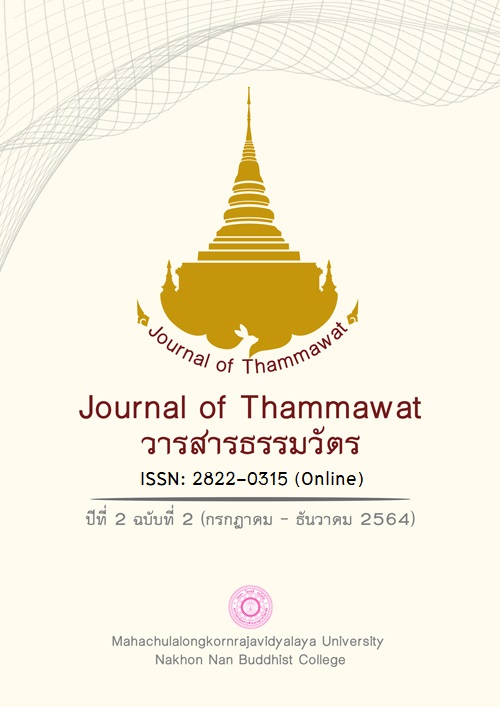Buddhism and Development of Leaders
Main Article Content
Abstract
In the era of globalized society that is a borderless world, problems about the leader is often occur in the present society. Leaders manage without unity, leaders abuse their power for the benefit of themselves and their peers, and are based on the principles of goodwill, regardless of the survival of most organizations or people.
Religious institutions are considered one of the most important institutions in Thailand along with the National and Monarchy. Especially Buddhism, which is a religion with doctrines and teachings that can be tested and proven according to science. Buddhism is a religion that has principles of development management, both personal development, human development and job development, has the principles of self-government, group governing, national or public society, Which is called “Buddhadhamma” (Buddhist morality). The monks have always been representatives of the religious institute that exists with Thai society. Monks have a great influence on encouraging or introducing social activities and causing many changes. They play a vital role in guiding the lives of most Thais in a moral way, using Buddhist principles to motivate or develop leaders. The leaders of various organizations are therefore very important to know Buddhist principles and put into practice in order to jointly develop the country to be stable and sustainable.
Article Details

This work is licensed under a Creative Commons Attribution-NonCommercial-NoDerivatives 4.0 International License.
References
ทินพันธ์ นาคะตะ. (2539). พระพุทธศาสนากับสังคมไทย. กรุงเทพฯ: สหธรรมมิก.
ทินพันธ์ นาคะตะ. (2544). พระพุทธศาสนากับสังคมไทย. พิมพ์ครั้งที่ 3. กรุงเทพฯ: สหายบล็อกการพิมพ์.
พระไพศาล วิสาโล. (2546). พระพุทธศาสนาไทยในอนาคต แนวโน้นและทางออกจากวิกฤติ. กรุงเทพฯ: มูลนิธิสดศรี–สฤษดิ์วงศ์.
พินิจ ลาภธนานันท์. (2529). บทบาทพระสงฆ์ในงานพัฒนาชนบท. สถาบันวิจัยสังคม: จุฬาลงกรณมหาวิทยาลัย.
เฟรด อี. ฟีดเลอร์, มาร์ติน เอ็ม เซเมอรส์ และ ลินดา มาฮาร์. (2531). ค้นหาความเป็นผู้นำ. เรียบเรียงโดย ชูชัยสมิทธิไกร. กรุงเทพฯ: ซีเอ็ดยูเคชั่น.
ภัทรพร สิริกาญจน. (2540). หน้าที่พระสงฆ์ตามพุทธบัญญัติ: แนวคิดและบทบาทพระคำเขียน สุวณฺโณ ในการพัฒนาชุมชน. กรุงเทพฯ: มหาวิทยาลัยธรรมศาสตร์.
มนตรี พีรพลพิพัฒน์. (2540). จริยธรรมกับภาวะผู้นำ: ศึกษาทัศนะนักวิชาการรัฐศาสตร์ในมหาวิทยาลัยแห่งประเทศที่มีต่อผู้นำทางการเมือง. (วิทยานิพนธ์ปริญญามหาบัณฑิต). คณะสังคมศาสตร์และมนุษย์ศาสตร์ มหาวิทยาลัยมหิดล.
มหาจุฬาลงกรณราชวิทยาลัย. (2539). พระไตรปิฎกภาษาไทย ฉบับมหาจุฬาลงกรณราชวิทยาลัย.กรุงเทพฯ: โรงพิมพ์มหาจุฬาลงกรณราชวิทยาลัย.


